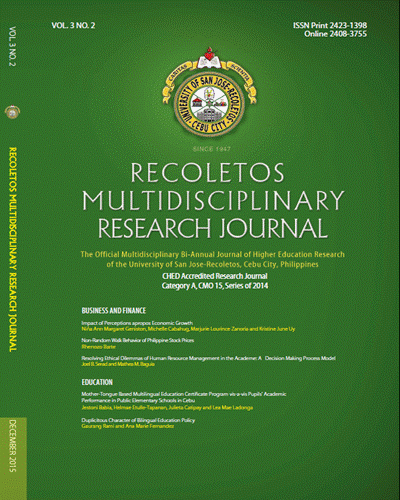The Duplicitous Character of Bilingual Education Policy
DOI:
https://doi.org/10.32871/rmrj1503.02.05Keywords:
Bilingual, Education, Cultural complexities, Cebu, PhilippinesAbstract
This study investigated the positioning of teacher education institutions (TEIs) in the glocalization continuum of bilingual complexities in responding to the global and local demands for harmonious and peaceful nation building. This study was exploratory in nature. The researchers used survey questionnaires to account the effects of more than four decades of enforcement of Bilingual Education in the Microcosm area in Cebu City (Philippines).Stratified sampling technique was employed; wherein strata were divided based on specialization of the 213 pre-service teachers. Cronbach’s alpha was usedto measure reliability and internal consistency of the instrument. Principle component method through factor analysis was utilized to reduce the data complexity and to identify important factors of bilingual education policy. Results revealed that bilingual education policy has duplicitous character in a non-native English country. Yet, it is a tool that can propel nation building. Much of it lies in the hands of the teacher education institutions’ power and capacity to ignite other industries of the country.
References
Maeroff, G. I. (1985, Sep 28). Debate on U.S. bilingual education: Blending methodology and society. New York Time.
National Commission for Culture and Arts. (2015, April 30). Language policies in the Philippines. Retrieved from http://ncca.gov.ph/subcommissions/subcommission-on-cultural-disseminationscd/language-and-translation/language-policies-in-the-philippines/
Owens, J. (2002, Nov 10). Districts struggling to fill bilingual-teacher posts; students in need of help on rise. Chicago Tribune Retrieved from http://ezproxy.usjr.edu.ph:2066/docview/419557918?accountid=33262
Padua, R. (2012, September). Principles of extension programs, paper presented at Cebu Normal University, Cebu City, September 2012.
Poe, J. T. (1998, Feb 16). The bilingual dilemma. Chicago Tribune Retrieved from http://ezproxy.usjr.edu.ph:2066/docview/418544750?accountid=33262
Subramanian, S., & Cassidy, J. (2006, Aug 31). New policy on bilingual classes. Orange County Register.
Downloads
Published
How to Cite
Issue
Section
License
Copyright of the Journal belongs to the University of San Jose-Recoletos


